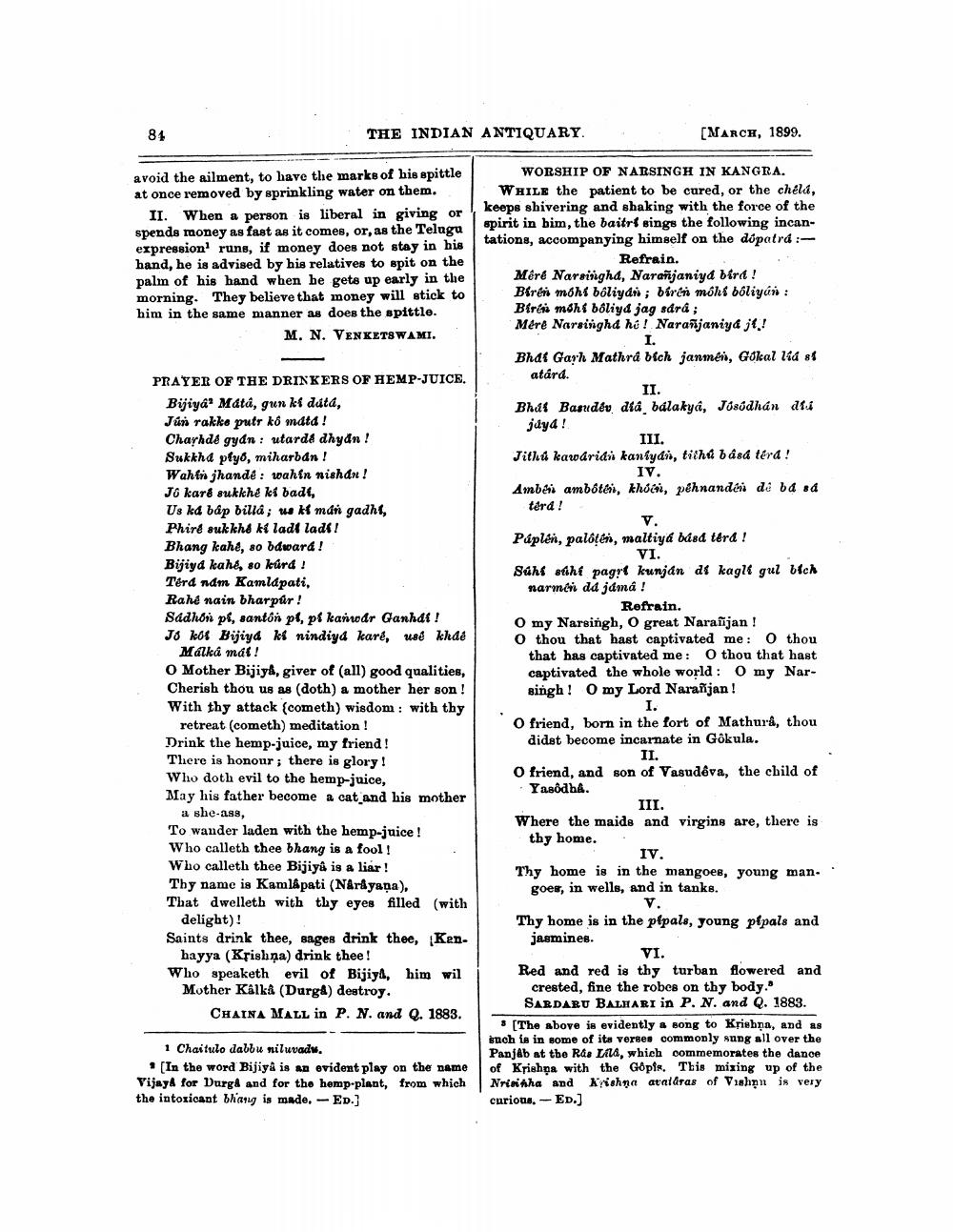________________
84
THE INDIAN ANTIQUARY.
avoid the ailment, to have the marks of his spittle at once removed by sprinkling water on them.
II. When a person is liberal in giving or spends money as fast as it comes, or, as the Telugu expression runs, if money does not stay in his hand, he is advised by his relatives to spit on the palm of his hand when he gets up early in the morning. They believe that money will stick to him in the same manner as does the spittle.
M. N. VENKETSWAMI.
PRAYER OF THE DRINKERS OF HEMP-JUICE. Bijiya Mata, gun ki dáta, Jún rakke putr ko mata! Charhdé gydn: utardé dhyan! Sukkha plyo, miharban!
Wahin jhandé: wahin nishan!
Jo karê sukkhé ki badi,
Us ka bap billa; us kí mán gadhi, Phiré sukkhé ki ladt ladi! Bhang kahé, so báward! Bijiyd kahe, so kúrd! Térá nám Kamlapati, Rahé nain bharpûr !
Sadhon på, santón på, på kanwar Ganhái! Jo kot Bijiya ki nindiya karé, usé kháé Malô mất!
O Mother Bijiya, giver of (all) good qualities, Cherish thou us as (doth) a mother her son! With thy attack (cometh) wisdom with thy retreat (cometh) meditation!
Drink the hemp-juice, my friend! There is honour; there is glory! Who doth evil to the hemp-juice,
May his father become a cat and his mother a she-ass,
To wander laden with the hemp-juice!
Who calleth thee bhang is a fool!
Who calleth thee Bijiyâ is a liar! Thy name is Kamlapati (Narayana), That dwelleth with thy eyes filled (with delight)!
Saints drink thee, sages drink thee, Kenhayya (Krishna) drink thee!
Who speaketh evil of Bijiya, him wil Mother Kalka (Durga) destroy.
CHAINA MALL in P. N. and Q. 1883.
1 Chaitulo dabbu niluvadu.
[In the word Bijiya is an evident play on the name Vijaya for Durga and for the hemp-plant, from which the intoxicant bhang is made. ED.]
[MARCH, 1899.
WORSHIP OF NARSINGH IN KANGRA. WHILE the patient to be cured, or the chelá, keeps shivering and shaking with the force of the spirit in him, the baitri sings the following incantations, accompanying himself on the dópatra:Refrain.
Mêré Narsingha, Naranjaniyá bírá! Birén mohi bôliyan; birên môhi bôliyán : Birin mohi boliya jag sára;
Mére Narsingha he! Naranjaniya ji.!
I.
Bhat Garh Mathra bích janmei, Gokal lid st atára.
II.
Bhat Basudev día bálakya, Jósódhán día jaya!
III. Jithu kawarian kaniyán, tilha bâsá téra! IV.
Amben ambôtén, khóin, pêhnanden de bá sá
térá!
V.
Páplén, palôtén, maltiyá básd térd!
VI.
Súhi sahi pagrt kunján di kagli gul bich narmén dá jámá !
Refrain.
O my Narsingh, O great Naranjan !
O thou that hast captivated me: O thou that has captivated me: O thou that hast captivated the whole world: O my Narsingh O my Lord Narañjan!
I.
O friend, born in the fort of Mathura, thou didst become incarnate in Gôkula.
II.
O friend, and son of Vasudeva, the child of Yasodha.
III. Where the maids and virgins are, there is thy home.
IV. Thy home is in the mangoes, young mangoes, in wells, and in tanks.
V.
Thy home is in the pipals, young pipals and jasmines.
VI.
Red and red is thy turban flowered and crested, fine the robes on thy body." SARDARU BALHARI in P. N. and Q. 1883.
[The above is evidently a song to Krishna, and as such is in some of its verses commonly sung all over the Panjab at the Rás Lila, which commemorates the dance of Krishna with the Gopis. This mixing up of the Nrisinha and Krishna avatáras of Vishnu is very curious. - ED.]




